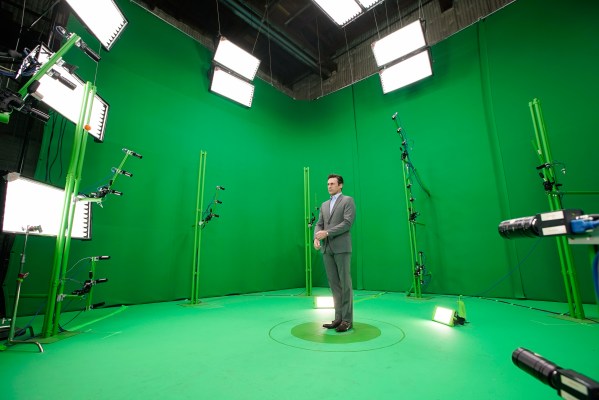For the celebrity-obsessed, augmented reality may offer the bizarre opportunity to get closer than ever to pop culture’s most recognizable stars and performers.
For the last several years, 8i has been embracing a technology called volumetric capture that trains several cameras on a figure and stitches the feeds together to create a three-dimensional model that can seamlessly be placed in any environment. 8i’s strategy has been focusing largely on bringing personalities into immersive experiences that viewers would otherwise not have access to.
What’s better than witnessing a full-scale recreation of the moon landing? Watching it as Buzz Aldrin walks you through it.
The company has largely been focusing its strategies on headset-based solutions, but the company is now looking to move forward and embrace phone-based augmented reality systems through the introduction of a new application called Holo, which will allow users to place some of 8i’s volumetrically captured holograms into their own homes.
Today, the company is announcing that it has closed a $27 million Series B round of funding led by Time Warner investments, with participation from Baidu Ventures, Hearst Ventures, Verizon Ventures, One Ventures, Seen & Speed Ventures and some of the firm’s previous investors.
This is notably the first outside investment in AR/VR coming from Baidu, the Chinese search giant that has been increasingly directing internal resources to consumer AR/VR. This past August, the company launched its own AR smartphone platform, DuSee, and, last month, Baidu opened an AR research lab and began directly integrating AR tech into its popular suite of apps.
8i’s new app will be launching later this year on Google Tango-compatible devices. Tango tech gives smartphones powerful depth-sensing capabilities that make the platform ideal for more sophisticated phone-based AR. The real limiting factor is the number of devices that currently support Tango. Though there are a few more devices on the way, at this point in time, Lenovo’s Phab 2 Pro is the only Tango phone on the market.
When asked about the possibility of Holo coming to phones without Tango functionality, 8i CEO Steve Raymond told me that Holo would very likely be launching on devices with more basic camera configurations in the future.
Right now, the most limiting factor for 8i in terms of growth is the amount of technical heavy-lifting required to create a high-end hologram. Most of the company’s high-quality stitches come from studio-grade setups that are both large and quite complicated.
Even with the complexity, 8i is still having difficulty creating smooth digitally rendered figures, though their software has been steadily improving. 8i Studios currently boasts more than 100 partners using its capture tech. The company notably isn’t interested in getting into the hardware space, but they are looking forward to more mobile volumetric capture devices being made available that will allow more simplistic footage to be taken and uploaded to their expansive network.
For now, the major focus is on getting AR tech into people’s hands and placing digital holograms into their physical lives.
